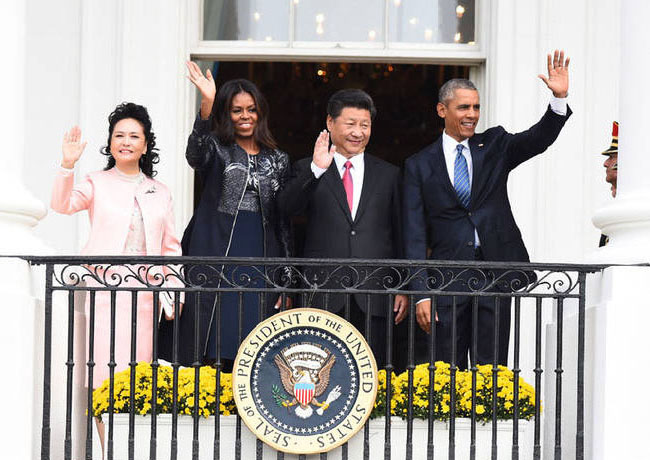Chinese President Xi Jinping recently concluded his state visit to the United States. Although the Obama-Xi meeting left much to be desired on contentious issues such as cyber security and the South China Sea, it was a significant and pleasant surprise that Xi softened some of the more pessimistic and suspicious sentiments in such a short time. Using words that appealed to the American public, Xi highlighted his respect for the U.S. and its people. At the same time, the U.S.-China consensus that was reached on cyber security was also an important development. In total, the Obama-Xi meeting accomplished more than anticipated.

Chinese President Xi Jinping, second from right, and his wife Peng Liyuan, left, wave hands after US President Barack Obama and First Lady Michelle Obama hold a welcome ceremony in White House, Sept 25, 2015.[Photo/Agencies]
Xi’s purchase of 300 Boeing planes also illustrated the strength and potential of the Chinese economy. In addition, Xi’s meeting with IT industry insiders touched upon key issues such as Chinese market access, intellectual property rights, and cybersecurity. This laid the groundwork for his state visit to Washington D.C. and alleviated the tense atmosphere preceding his visit.
In fact, the core purpose of the Chinese leader’s visit was to deescalate tensions, enhance mutual respect, and emphasize the importance of peaceful co-existence.
First, the goal of Xi’s visit was to reiterate that the U.S.-China relationship is not zero-sum and need not take a collision course. In the past few months, the amount of friction in U.S.-China relations escalated the likelihood of unintended conflicts. Xi’s visit was successful in reducing the possibility of conflict and further deterioration of the relationship.
Second, Xi’s visit furthered the extensive cooperation between both countries. Though the two sides failed to reach a consensus on the South China Sea issue, Xi did address the topic of de-militarization. Regarding cybersecurity, the two parties also established a framework agreement. The framework adopted a new term, “cybercrime,” instead of “cyber theft,” which the Chinese found offensive. This demonstrates the constructive interaction between the two countries. As a result, advancement in the protection of commercial intellectual property rights is expected. This was clearly demonstrated by the corresponding meetings Xi had in Seattle. In addition, the fact that the guests of honor at the main table of the White House state banquet were predominantly CEOs from the financial sector and technology companies show the promise in China’s financial liberalization and gradual opening up of its IT industry.
Third, the visit will promote the continued implementation of China’s domestic reforms. The true focus of Xi’s U.S. visit was not actually on China’s international dimensions. Instead, the visit was intended to promote economic and other reforms back home, and this was achieved through demonstrations of respect, prestige, and promises that Xi won on the international stage.
Although Obama avoided adopting the “new type” terminology, his administration’s recognition of “non-confrontation” and emphasis on mutually beneficial cooperation and mutual respect is comparable to what China defines as a “new type of major-country relationship.” The American side has applied concepts that represent “new-type” ties–only they have not adopted a formal expression like that of the Chinese.
At the Sept 25 State Department luncheon Vice President Biden hosted in Xi’s honor, Xi departed from the prepared script during his speech, saying he was “deeply moved.” This was an indication that the two heads of state had positive interactions during their private talks the previous night. Otherwise, Xi would not have displayed his more personable side. To confirm the success of the state visit, at their joint press conference, Obama described the meetings as “extremely productive.” Both leaders’ optimistic expressions were indicative of the fact that Xi’s U.S. visit was extremely fruitful.
The Obama-Xi meeting took place in a challenging atmosphere, but at the same time, that meant the leaders were eager for a favorable outcome. The Xi visit was not only very smooth, but it also resulted in the two countries building a strong strategic framework, and they are now embarking on a path of cooperation instead of one of confrontation.
